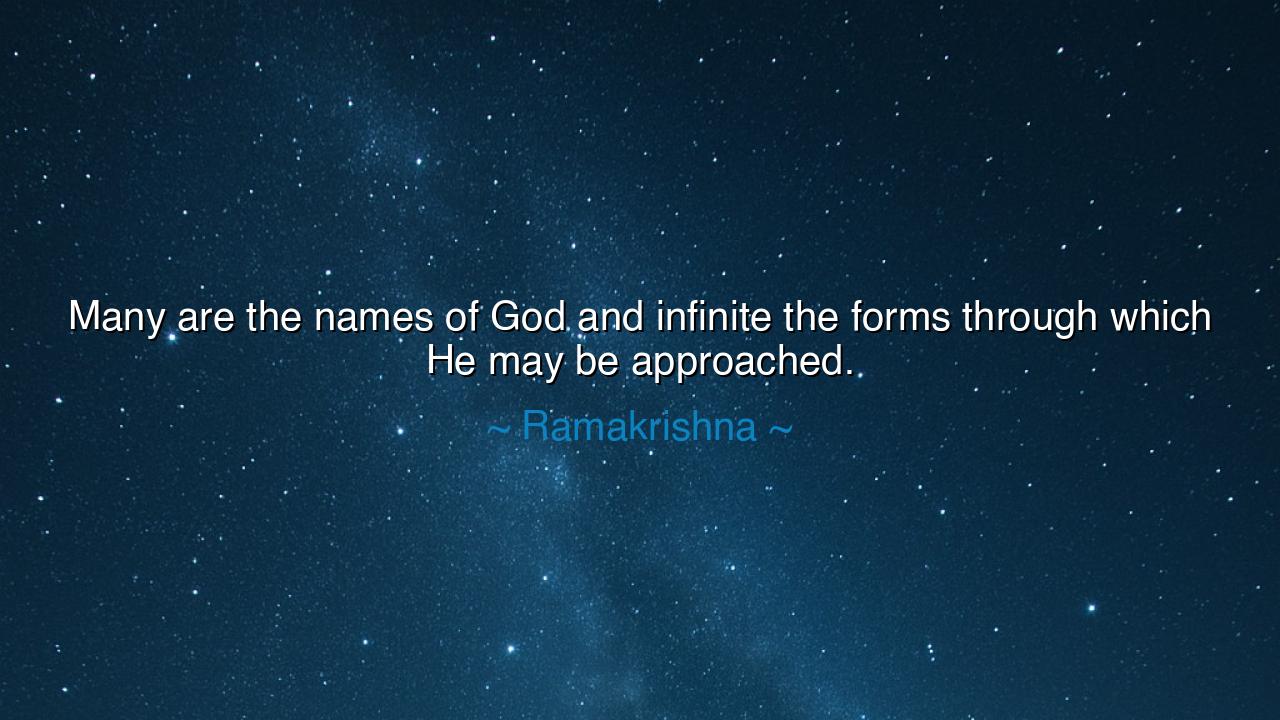
Many are the names of God and infinite the forms through which He






“Many are the names of God and infinite the forms through which He may be approached.” — these words of Sri Ramakrishna, the saint of Dakshineswar, echo like a hymn across the ages, calling humankind to the recognition of divine unity amidst diversity. In these simple yet profound words lies the wisdom of one who had touched the heart of the Infinite, and who saw, not division among faiths, but harmony — not rivalry among religions, but revelation. Ramakrishna’s teaching was born not from speculation, but from direct experience. He had walked the paths of many faiths — Hinduism, Islam, and Christianity — and in every path, he found the same Presence, the same ocean of love behind different waves of devotion. His words are not merely poetic; they are a map for the soul’s journey toward the Divine, however one names Him.
The origin of this quote is rooted in Ramakrishna’s own life and spiritual experiments in nineteenth-century India. Living near Calcutta, he served as a priest at the temple of the Goddess Kali, yet his heart overflowed beyond any single form of worship. In his quest for truth, he practiced different religious disciplines — he prayed to Allah as a Muslim, meditated on Christ as a Christian, and immersed himself in the nondual silence of the Advaitin sage. Each time, he reached the same summit of divine realization. When he declared that “many are the names of God and infinite the forms through which He may be approached,” it was not philosophy; it was testimony. He spoke as one who had seen the sun rising from many horizons, yet knew it was the same sun shining for all.
To the ancients, this truth would have been the language of the seers — for they, too, glimpsed the Infinite reflected in countless forms. The Rig Veda, one of humanity’s oldest scriptures, declares, “Ekam sat vipra bahudha vadanti” — “Truth is one, the wise call it by many names.” Ramakrishna’s voice was the modern echo of that eternal song. He stood in a world where men fought in the name of religion, yet he proclaimed that all paths, when pursued with sincerity and love, lead to the same Divine Reality. To him, the quarrels of the faithful were like children arguing over the color of water drawn from the same river. The truth, he said, is beyond all names and forms, yet it reveals itself through them, because God is infinite — and so must be His expressions.
To understand this, imagine a mountain whose peak is hidden by clouds. From the east, one path winds through forests; from the west, another climbs over stones; from the south, another crosses streams. Each pilgrim believes their way is best, for it leads them upward. Yet when they reach the summit, the paths converge, and they stand together in the same light. This is the vision of Ramakrishna — that all religions are but the paths of pilgrims ascending toward the same Truth. To scorn another’s path is to forget that the goal is not the road, but the peak. He once said, “Why quarrel over different roads when the destination is one?” Thus, in his temple, he could bow before Kali one day and revere Christ the next — not as contradiction, but as completeness.
History itself bears witness to this divine inclusiveness. Consider Mahatma Gandhi, who, inspired by Ramakrishna’s disciple Swami Vivekananda, embodied the same spirit of unity. Gandhi read the Bhagavad Gita every day, but he also drew wisdom from the Bible and the Quran. He often said, “I am a Hindu, a Muslim, a Christian, a Jew, and a Buddhist,” not as a riddle, but as a revelation — the understanding that to serve truth and love is to serve God in whatever form one recognizes. In his life of compassion and sacrifice, Gandhi lived out Ramakrishna’s message: that the Divine is not confined to temples or creeds, but lives in every heart that loves and every act that uplifts.
But let no one think that this teaching makes all religions shallow or equal in sameness. Ramakrishna did not say that all paths are identical — he said that all paths are valid when they are sincere. The test of truth is not in dogma, but in transformation. If one’s faith fills the heart with love, humility, and peace, then that faith has touched God, whatever its form. Yet if one’s creed breeds hatred or pride, then it has become a shell without spirit. To approach God, said Ramakrishna, is to awaken to love — and love has no boundaries. The infinite forms of God are mirrors for the infinite capacities of the human soul.
So, my child, take this wisdom as a flame to light your way. When you see others kneel in a different manner, call upon a different name, or sing in a different tongue, remember: the melody is one, though the instruments differ. Do not mock the faith of another; learn from it. Seek the essence, not the shell. Let your heart grow vast enough to embrace all who love the Divine, however they conceive Him. For when you honor another’s path, you honor the boundless diversity of God’s own self-expression.
And finally, remember the lesson Ramakrishna left for the world: the Infinite cannot be imprisoned by the finite. Do not spend your life arguing which name of God is greatest; instead, let your life itself become a prayer — a living act of love, compassion, and truth. Approach God through service, through kindness, through awe. For every act of goodness is a step toward Him, and every loving heart is His temple. In that understanding lies the peace the world has forgotten — and the unity that only the Infinite can give.






AAdministratorAdministrator
Welcome, honored guests. Please leave a comment, we will respond soon